Nursing Practice Reflection: Managing Borderline Personality Disorder
VerifiedAdded on 2023/06/11
|5
|1004
|349
Journal and Reflective Writing
AI Summary
This reflective journal entry details a student nurse's experience with a patient diagnosed with borderline personality disorder (BPD) who did not initially respond well to treatment. Utilizing Gibbs' reflective cycle, the author examines their feelings, evaluates the experience, analyzes their understanding of nursing practice, and concludes with actionable steps for future improvement. The reflection highlights the importance of understanding the patient's background, including potential substance abuse issues, and the need for further education and training to provide effective, patient-centered care for individuals with BPD. The author acknowledges the emotional challenges faced and emphasizes the commitment to improving patient outcomes through continuous learning and professional development. This document is available on Desklib, a platform offering a variety of study tools and solved assignments.
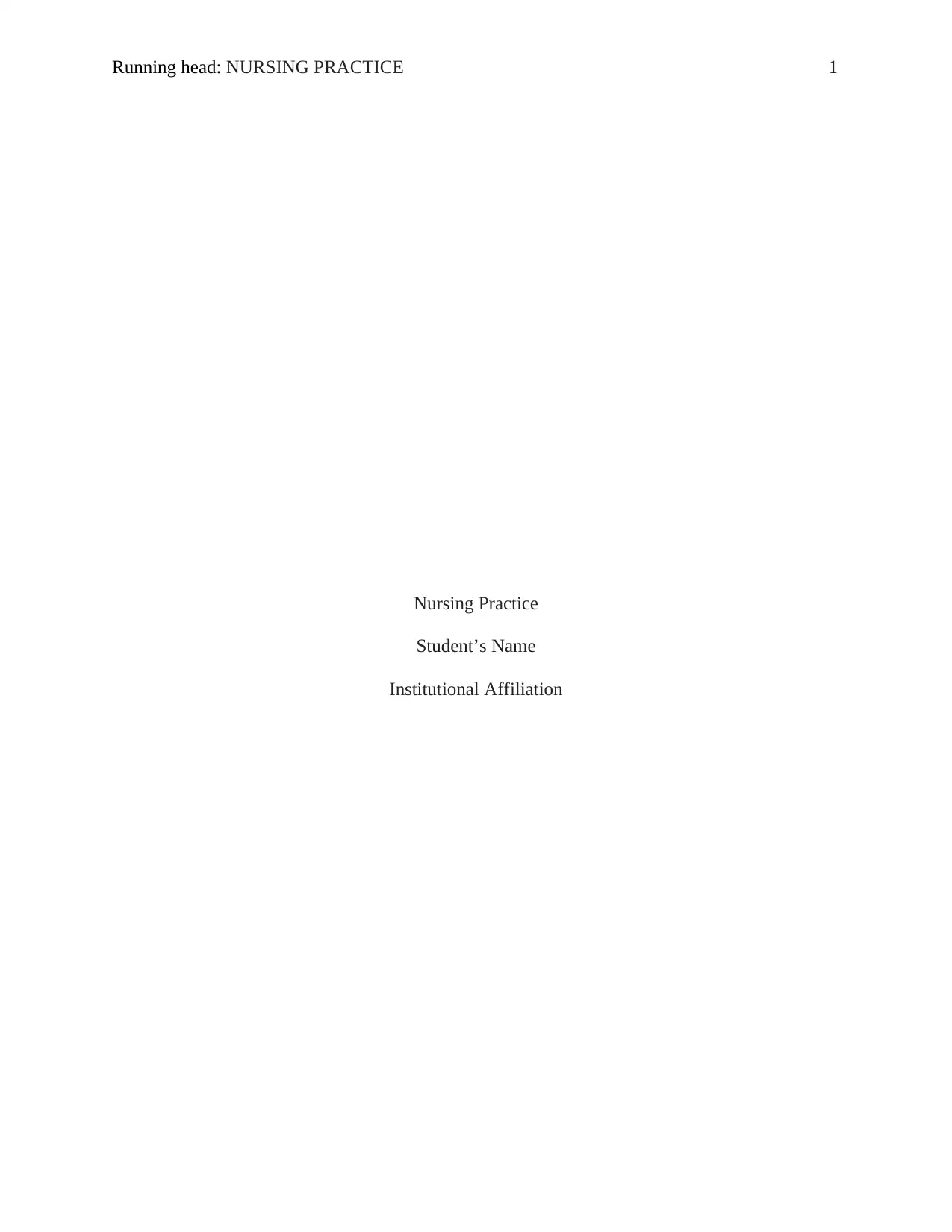
Running head: NURSING PRACTICE 1
Nursing Practice
Student’s Name
Institutional Affiliation
Nursing Practice
Student’s Name
Institutional Affiliation
Paraphrase This Document
Need a fresh take? Get an instant paraphrase of this document with our AI Paraphraser
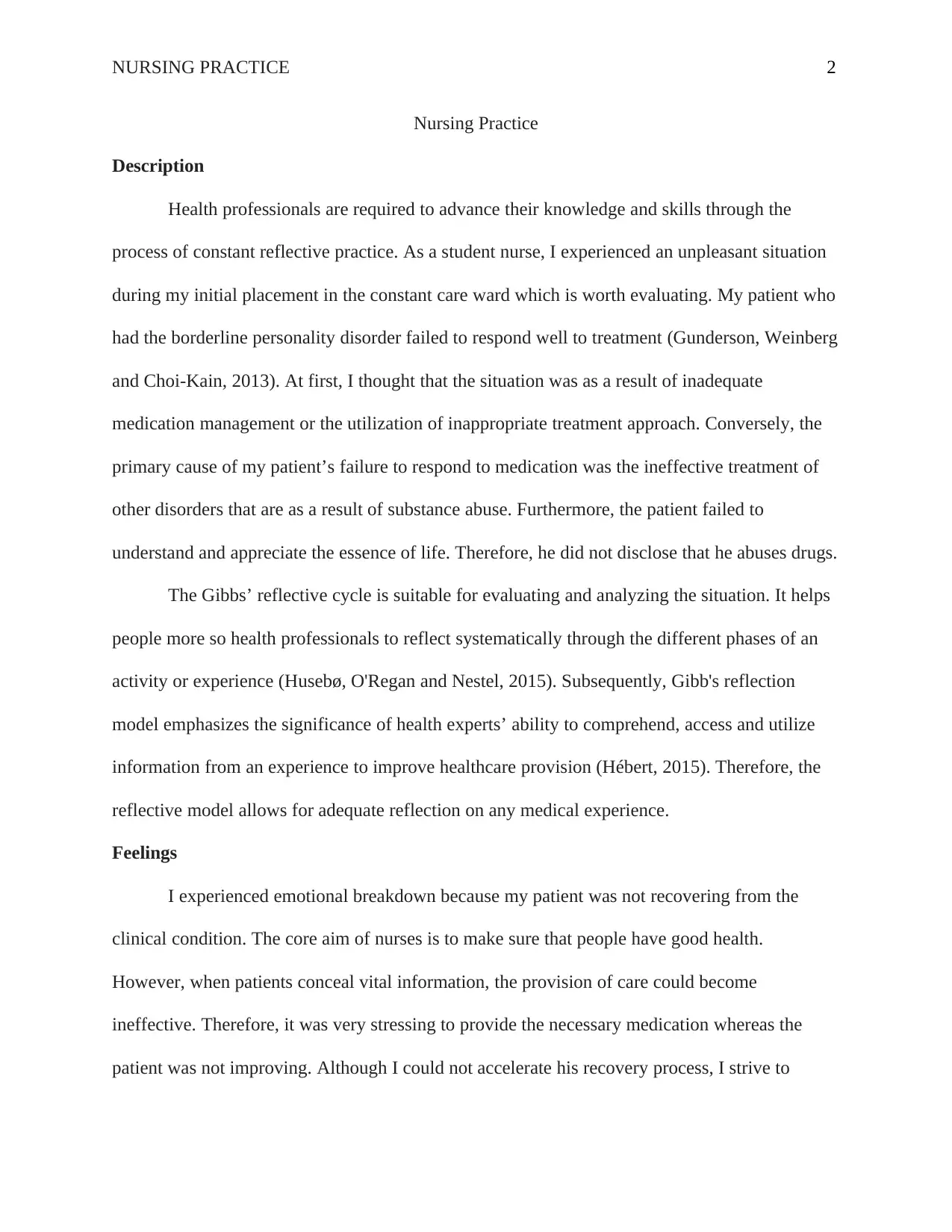
NURSING PRACTICE 2
Nursing Practice
Description
Health professionals are required to advance their knowledge and skills through the
process of constant reflective practice. As a student nurse, I experienced an unpleasant situation
during my initial placement in the constant care ward which is worth evaluating. My patient who
had the borderline personality disorder failed to respond well to treatment (Gunderson, Weinberg
and Choi-Kain, 2013). At first, I thought that the situation was as a result of inadequate
medication management or the utilization of inappropriate treatment approach. Conversely, the
primary cause of my patient’s failure to respond to medication was the ineffective treatment of
other disorders that are as a result of substance abuse. Furthermore, the patient failed to
understand and appreciate the essence of life. Therefore, he did not disclose that he abuses drugs.
The Gibbs’ reflective cycle is suitable for evaluating and analyzing the situation. It helps
people more so health professionals to reflect systematically through the different phases of an
activity or experience (Husebø, O'Regan and Nestel, 2015). Subsequently, Gibb's reflection
model emphasizes the significance of health experts’ ability to comprehend, access and utilize
information from an experience to improve healthcare provision (Hébert, 2015). Therefore, the
reflective model allows for adequate reflection on any medical experience.
Feelings
I experienced emotional breakdown because my patient was not recovering from the
clinical condition. The core aim of nurses is to make sure that people have good health.
However, when patients conceal vital information, the provision of care could become
ineffective. Therefore, it was very stressing to provide the necessary medication whereas the
patient was not improving. Although I could not accelerate his recovery process, I strive to
Nursing Practice
Description
Health professionals are required to advance their knowledge and skills through the
process of constant reflective practice. As a student nurse, I experienced an unpleasant situation
during my initial placement in the constant care ward which is worth evaluating. My patient who
had the borderline personality disorder failed to respond well to treatment (Gunderson, Weinberg
and Choi-Kain, 2013). At first, I thought that the situation was as a result of inadequate
medication management or the utilization of inappropriate treatment approach. Conversely, the
primary cause of my patient’s failure to respond to medication was the ineffective treatment of
other disorders that are as a result of substance abuse. Furthermore, the patient failed to
understand and appreciate the essence of life. Therefore, he did not disclose that he abuses drugs.
The Gibbs’ reflective cycle is suitable for evaluating and analyzing the situation. It helps
people more so health professionals to reflect systematically through the different phases of an
activity or experience (Husebø, O'Regan and Nestel, 2015). Subsequently, Gibb's reflection
model emphasizes the significance of health experts’ ability to comprehend, access and utilize
information from an experience to improve healthcare provision (Hébert, 2015). Therefore, the
reflective model allows for adequate reflection on any medical experience.
Feelings
I experienced emotional breakdown because my patient was not recovering from the
clinical condition. The core aim of nurses is to make sure that people have good health.
However, when patients conceal vital information, the provision of care could become
ineffective. Therefore, it was very stressing to provide the necessary medication whereas the
patient was not improving. Although I could not accelerate his recovery process, I strive to
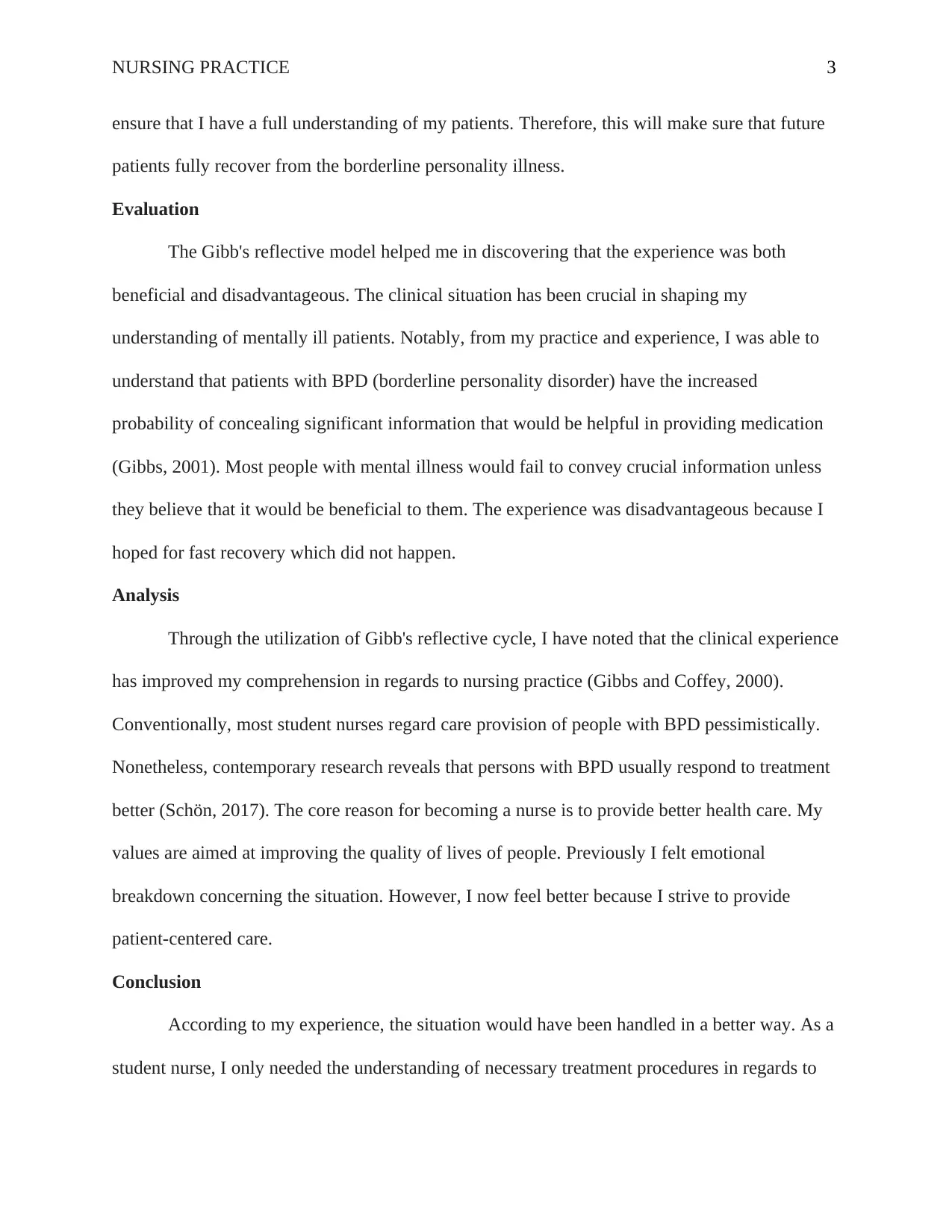
NURSING PRACTICE 3
ensure that I have a full understanding of my patients. Therefore, this will make sure that future
patients fully recover from the borderline personality illness.
Evaluation
The Gibb's reflective model helped me in discovering that the experience was both
beneficial and disadvantageous. The clinical situation has been crucial in shaping my
understanding of mentally ill patients. Notably, from my practice and experience, I was able to
understand that patients with BPD (borderline personality disorder) have the increased
probability of concealing significant information that would be helpful in providing medication
(Gibbs, 2001). Most people with mental illness would fail to convey crucial information unless
they believe that it would be beneficial to them. The experience was disadvantageous because I
hoped for fast recovery which did not happen.
Analysis
Through the utilization of Gibb's reflective cycle, I have noted that the clinical experience
has improved my comprehension in regards to nursing practice (Gibbs and Coffey, 2000).
Conventionally, most student nurses regard care provision of people with BPD pessimistically.
Nonetheless, contemporary research reveals that persons with BPD usually respond to treatment
better (Schön, 2017). The core reason for becoming a nurse is to provide better health care. My
values are aimed at improving the quality of lives of people. Previously I felt emotional
breakdown concerning the situation. However, I now feel better because I strive to provide
patient-centered care.
Conclusion
According to my experience, the situation would have been handled in a better way. As a
student nurse, I only needed the understanding of necessary treatment procedures in regards to
ensure that I have a full understanding of my patients. Therefore, this will make sure that future
patients fully recover from the borderline personality illness.
Evaluation
The Gibb's reflective model helped me in discovering that the experience was both
beneficial and disadvantageous. The clinical situation has been crucial in shaping my
understanding of mentally ill patients. Notably, from my practice and experience, I was able to
understand that patients with BPD (borderline personality disorder) have the increased
probability of concealing significant information that would be helpful in providing medication
(Gibbs, 2001). Most people with mental illness would fail to convey crucial information unless
they believe that it would be beneficial to them. The experience was disadvantageous because I
hoped for fast recovery which did not happen.
Analysis
Through the utilization of Gibb's reflective cycle, I have noted that the clinical experience
has improved my comprehension in regards to nursing practice (Gibbs and Coffey, 2000).
Conventionally, most student nurses regard care provision of people with BPD pessimistically.
Nonetheless, contemporary research reveals that persons with BPD usually respond to treatment
better (Schön, 2017). The core reason for becoming a nurse is to provide better health care. My
values are aimed at improving the quality of lives of people. Previously I felt emotional
breakdown concerning the situation. However, I now feel better because I strive to provide
patient-centered care.
Conclusion
According to my experience, the situation would have been handled in a better way. As a
student nurse, I only needed the understanding of necessary treatment procedures in regards to
⊘ This is a preview!⊘
Do you want full access?
Subscribe today to unlock all pages.

Trusted by 1+ million students worldwide
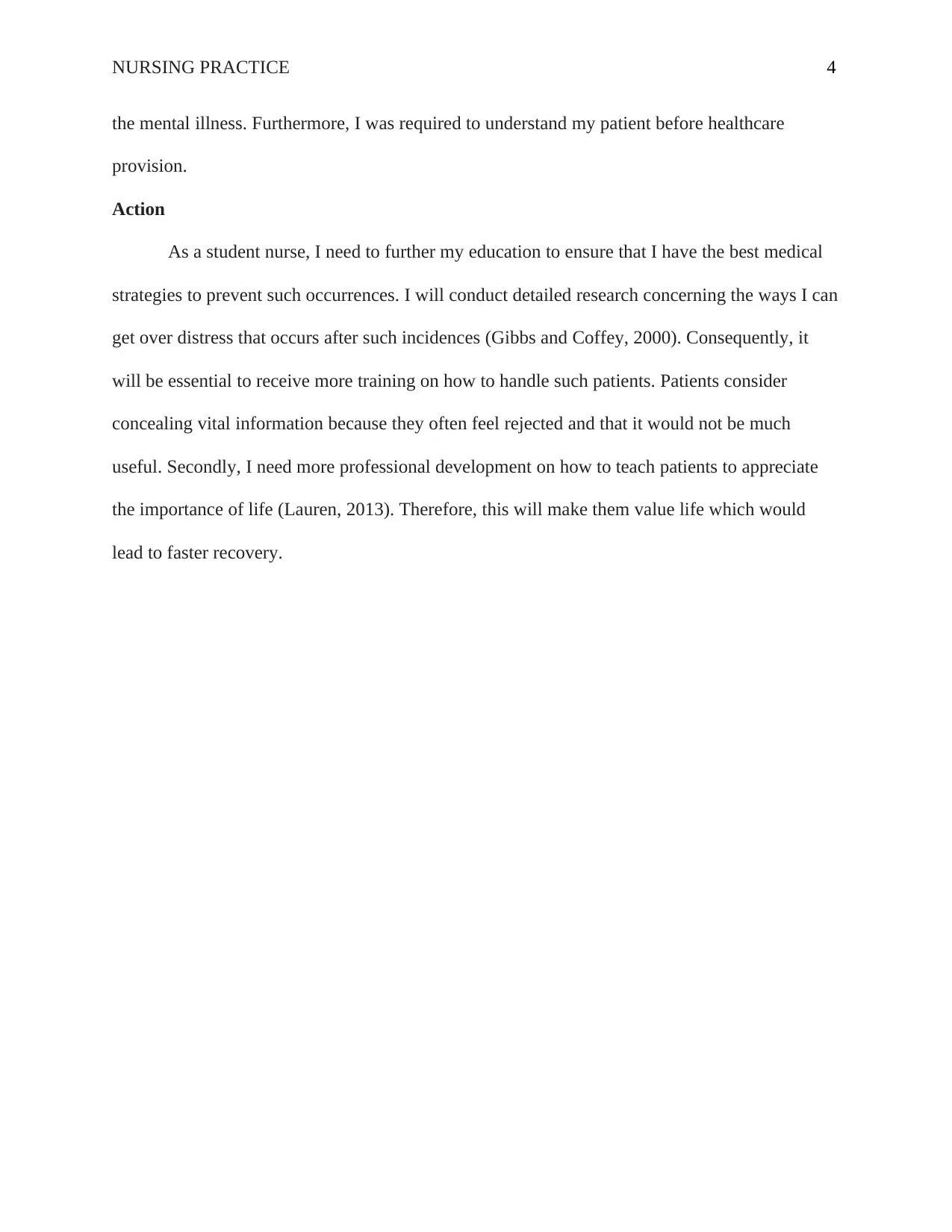
NURSING PRACTICE 4
the mental illness. Furthermore, I was required to understand my patient before healthcare
provision.
Action
As a student nurse, I need to further my education to ensure that I have the best medical
strategies to prevent such occurrences. I will conduct detailed research concerning the ways I can
get over distress that occurs after such incidences (Gibbs and Coffey, 2000). Consequently, it
will be essential to receive more training on how to handle such patients. Patients consider
concealing vital information because they often feel rejected and that it would not be much
useful. Secondly, I need more professional development on how to teach patients to appreciate
the importance of life (Lauren, 2013). Therefore, this will make them value life which would
lead to faster recovery.
the mental illness. Furthermore, I was required to understand my patient before healthcare
provision.
Action
As a student nurse, I need to further my education to ensure that I have the best medical
strategies to prevent such occurrences. I will conduct detailed research concerning the ways I can
get over distress that occurs after such incidences (Gibbs and Coffey, 2000). Consequently, it
will be essential to receive more training on how to handle such patients. Patients consider
concealing vital information because they often feel rejected and that it would not be much
useful. Secondly, I need more professional development on how to teach patients to appreciate
the importance of life (Lauren, 2013). Therefore, this will make them value life which would
lead to faster recovery.
Paraphrase This Document
Need a fresh take? Get an instant paraphrase of this document with our AI Paraphraser
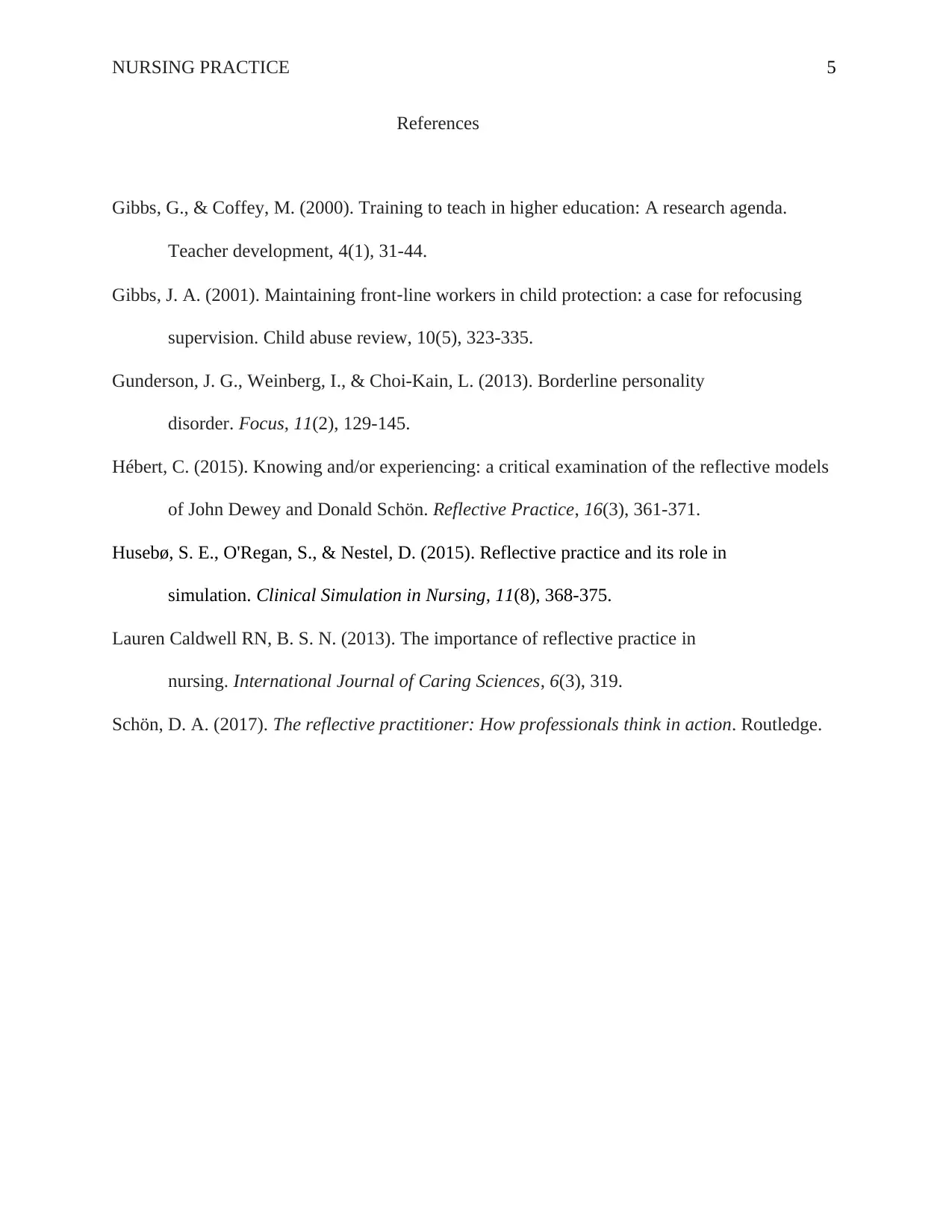
NURSING PRACTICE 5
References
Gibbs, G., & Coffey, M. (2000). Training to teach in higher education: A research agenda.
Teacher development, 4(1), 31-44.
Gibbs, J. A. (2001). Maintaining front‐line workers in child protection: a case for refocusing
supervision. Child abuse review, 10(5), 323-335.
Gunderson, J. G., Weinberg, I., & Choi-Kain, L. (2013). Borderline personality
disorder. Focus, 11(2), 129-145.
Hébert, C. (2015). Knowing and/or experiencing: a critical examination of the reflective models
of John Dewey and Donald Schön. Reflective Practice, 16(3), 361-371.
Husebø, S. E., O'Regan, S., & Nestel, D. (2015). Reflective practice and its role in
simulation. Clinical Simulation in Nursing, 11(8), 368-375.
Lauren Caldwell RN, B. S. N. (2013). The importance of reflective practice in
nursing. International Journal of Caring Sciences, 6(3), 319.
Schön, D. A. (2017). The reflective practitioner: How professionals think in action. Routledge.
References
Gibbs, G., & Coffey, M. (2000). Training to teach in higher education: A research agenda.
Teacher development, 4(1), 31-44.
Gibbs, J. A. (2001). Maintaining front‐line workers in child protection: a case for refocusing
supervision. Child abuse review, 10(5), 323-335.
Gunderson, J. G., Weinberg, I., & Choi-Kain, L. (2013). Borderline personality
disorder. Focus, 11(2), 129-145.
Hébert, C. (2015). Knowing and/or experiencing: a critical examination of the reflective models
of John Dewey and Donald Schön. Reflective Practice, 16(3), 361-371.
Husebø, S. E., O'Regan, S., & Nestel, D. (2015). Reflective practice and its role in
simulation. Clinical Simulation in Nursing, 11(8), 368-375.
Lauren Caldwell RN, B. S. N. (2013). The importance of reflective practice in
nursing. International Journal of Caring Sciences, 6(3), 319.
Schön, D. A. (2017). The reflective practitioner: How professionals think in action. Routledge.
1 out of 5
Related Documents
Your All-in-One AI-Powered Toolkit for Academic Success.
+13062052269
info@desklib.com
Available 24*7 on WhatsApp / Email
![[object Object]](/_next/static/media/star-bottom.7253800d.svg)
Unlock your academic potential
Copyright © 2020–2026 A2Z Services. All Rights Reserved. Developed and managed by ZUCOL.





